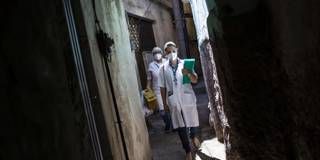As bad as the COVID-19 pandemic has been for major advanced economies, it is even worse for low-income countries that entered the crisis with only limited resources and already-high debt burdens. The international community must do more to help these governments confront the virus, or this crisis will never truly be over.
WASHINGTON, DC/THE HAGUE – Owing to the COVID-19 pandemic, the global economy is suffering its sharpest decline since the Great Depression. But while everybody is hurting, it is the world’s poorest countries that will pay the highest price unless they receive more help.
Some 1.5 billion people live in low-income developing countries, struggling to overcome weak public health systems, limited institutional capacity, and, in many cases, high debt levels. All these countries entered the crisis with a limited capability to fight it. They faced a dramatic increase in spending needs just when the pandemic caused a decline in revenues from tourism, remittances, and commodity prices. While actions to protect advanced-economy businesses and workers amounted to some 20% of GDP, this support in low-income countries was only about 2%.
With as many as 115 million additional people at risk of falling into extreme poverty this year, today’s deep economic decline is threatening to reverse two decades of gains in living standards. The current damage will last for many years to come, as children – especially girls – drop out of school, the quality of health services deteriorates, and employment levels remain depressed.

WASHINGTON, DC/THE HAGUE – Owing to the COVID-19 pandemic, the global economy is suffering its sharpest decline since the Great Depression. But while everybody is hurting, it is the world’s poorest countries that will pay the highest price unless they receive more help.
Some 1.5 billion people live in low-income developing countries, struggling to overcome weak public health systems, limited institutional capacity, and, in many cases, high debt levels. All these countries entered the crisis with a limited capability to fight it. They faced a dramatic increase in spending needs just when the pandemic caused a decline in revenues from tourism, remittances, and commodity prices. While actions to protect advanced-economy businesses and workers amounted to some 20% of GDP, this support in low-income countries was only about 2%.
With as many as 115 million additional people at risk of falling into extreme poverty this year, today’s deep economic decline is threatening to reverse two decades of gains in living standards. The current damage will last for many years to come, as children – especially girls – drop out of school, the quality of health services deteriorates, and employment levels remain depressed.